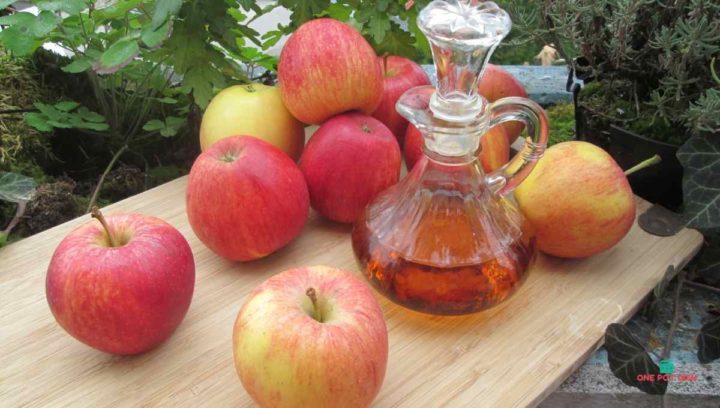Does vinegar freeze?
- To find out if vinegar freezes well, I did an experiment.
- I filled up a glass jar with water and added two tablespoons of white distilled vinegar. Then I placed the jar in my freezer overnight.
- When I took the jar out of the freezer the next morning, there was no liquid inside. Instead, the jar was completely frozen.
- So, does vinegar freeze? Yes, it does! But, it takes a little longer than regular water.
Why does vinegar freeze slower than regular water?
It has something to do with the fact that vinegar contains alcohol, and so the freezing point is lower or colder than water.
But what about the taste? Will drinking vinegar freeze your tongue?
No, it won’t. Because the freezer vinegar is not that cold.
We use vinegar in so many different ways. It can be used for various things, such as cleaning, cooking, and sanitizing.
Since vinegar can go a long way, we often buy it in large containers. However, we need to consider ways to preserve and store it so that we don’t waste it until we need it again.
This post will talk about all of the essential information about freezing vinegar. You will learn about its shelf life, the process of freezing it, and many more.
What Is Vinegar?
Vinegar is a fascinating and sometimes misunderstood ingredient; it can offer various benefits. Many people take it for granted because it’s always there, and you can reach it on any day.
This sour condiment comprises acetic acid, chemicals with various additives, and trace chemicals. You can make it by fermenting ethanol or adding multiple types of sugars.

There are many types of vinegar in existence. Rice vinegar, apple cider vinegar, red wine vinegar, balsamic vinegar, and white vinegar are examples.
Different Types of Vinegar
There are many types of vinegar in existence. Rice vinegar, apple cider vinegar, red wine vinegar, balsamic vinegar, and white vinegar are examples.
There are two main styles or categories of vinegar: distilled and raw.
Distilled vinegar has undergone a chemical process that removes water from the alcohol. This makes it less acidic than raw vinegar. Raw vinegar is made by fermenting fresh fruit juice. The fermentation process turns the sugar into acetic acid.
White or Distilled Vinegar
The first thing to know about storing vinegar is that white vinegar has a shorter shelf life than distilled vinegar. White vinegar has a shelf life of only six months, whereas distilled vinegar has a shelf life between one and three years. This means that if you want to keep white vinegar longer, you’ll need to refrigerate it. If you’re looking for a longer shelf life, then you should opt for distilled vinegar.
Apple Cider Vinegar
The first thing that comes to mind when you think of vinegar is apple cider vinegar (ACV). ACV has become one of our favorite kitchen staples because of its versatility. It’s great for salad dressings, marinades, and sauces. It’s also great for cleaning.
Red Wine Vinegar
The best way to store red wine vinegar is in the refrigerator. This will keep it fresh and prevent it from going bad.
Rice Vinegar is also popular.

Vinegar Shelf Life
The shelf life of vinegar and the expiration date is not known it is very long. As much as they are written on the bottles, they are just guidelines for enjoying the best results from your vinegar solution.
However, you still need to store them in darker and cooler parts of the pantry, as it will go off if left in warm sunny locations.
The acidic feature of this solution makes it a self-preservative product. There are varying thoughts about how long it should take to get the best results when using it.
Some people say it should not go past six months, while others say it should last for two years. There are speculations regarding this matter. To be safe, consume the vinegar you’re storing in your pantry within the year.
Does Vinegar Freeze?
Yes, vinegar freezes. The freezing point of vinegar is generally 28 degrees Fahrenheit. It means that you can prepare it without too much effort.
It’s perfectly safe to freeze vinegar. However, there are some differences between different types of vinegar. For instance, some people might experience a slightly distinct freezing reaction when they put vinegar in the freezer.
A note to keep in mind about freezing is that this process can dilute the acidity of the vinegar. It happens when you leave the condiment on the shelf for a long time.
One of the main reasons people don’t freeze their vinegar is that the process can take away its pungent aroma. This issue occurs when water gets into the solution.
However, freezing does not affect the taste of the vinegar. You can still use it in different ways once it’s defrosted.
How to Freeze Vinegar?
Since vinegar can get damaged by freezing in the cold, it is essential to store it in plastic instead of a glass bottle. It will prevent it from breaking and creating a mess.

You should also make sure that the container you use for freezing is clean and has a tight lid. It will prevent the vinegar from leaking.
Also, you can use smaller containers for storing vinegar. If you plan on using it often, storing multiple containers will allow you to unfreeze it more quickly.
Ideally, store it in the freezer until you’re ready to make a meal or clean something. Then, take a new bottle and freeze it.
Suppose you’re looking for an even more creative way to store and use vinegar. You can use rubber ice trays that you can buy on the internet. You can get a vinegar block and throw it into the pot.
How Long Will Vinegar Last in the Fridge/Freezer?
Vinegar can last indefinitely in a fridge or a freezer. However, it can still lose its acidity if frozen too long.
If you’re mixing vinegar with other ingredients, defrost the blocks first to ensure that the taste is still apparent in your cooking.
Also, ensure that you don’t accidentally put water into the ice trays or freezing containers to avoid ruining this condiment.
How to Tell if Your Frozen Vinegar Is Bad?
The best way to tell if your frozen vinegar is bad is by looking at the color. If it’s dark brown, then it has gone bad. If it’s clear, then it hasn’t gone bad yet.
What To Do With Frozen Vinegar?
There are many uses for frozen vinegar. For example, if you want to keep some extra bottles around, you can freeze them and then transfer them into smaller containers once they’re thawed. This makes it easy to take them along wherever you go.
You can also use it to clean your refrigerator. Just pour some vinegar onto a sponge and wipe down the inside of your fridge. If you want to remove odors from your kitchen, you can mix vinegar with baking soda and scrub away!
How Can You Defrost Frozen Vinegar?
To defrost frozen vinegar, simply place it in room temperature water. The vinegar will slowly start to thaw out. If you want to speed up the process, you can microwave it. Simply heat it in the microwave for 1 minute at a time, stirring after each interval. This method may not be effective if you’re using a lot of vinegar. In this case, you should let it sit in room temperature water overnight.
How do you know whether vinegar freezes?
You can tell whether vinegar has frozen by shaking the jar. If the liquid moves around freely, then the vinegar hasn’t frozen yet. However, if the liquid remains still, then the vinegar has frozen.
Do you need to worry about putting vinegar in your refrigerator?
Yes, you should always store vinegar in the refrigerator if you want to keep it a long time. It’s important to keep it cold so that the vinegar doesn’t spoil.
Wrapping up
Storing all kinds of food is very important to prevent illness and food poisoning. It’s also crucial to remember that vinegar is a self-preserving product.
Although sediment might appear at the bottom of the container, it’s not a cause for concern since it’s pure vinegar.
To keep it safe, avoid consuming regular vinegar daily. It’s also important to note that vinegar doesn’t extend the shelf life of other food.